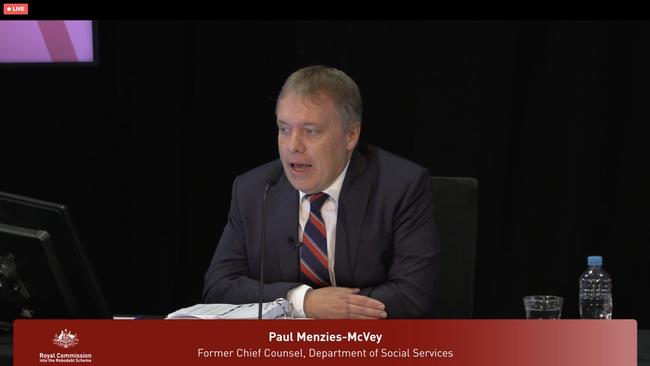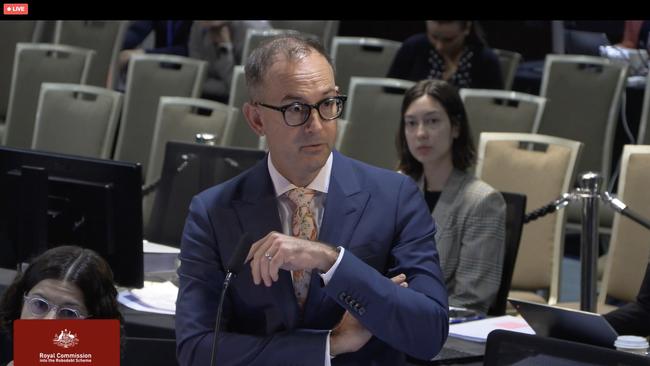Former senior bureaucrat Paul Menzies-McVey ’didn't see an issue’ with robodebt
A former high-ranking government lawyer knew robodebt was potentially illegal while it was still in operation.
A former high-ranking department lawyer has conceded he “didn’t see an issue” with the robodebt scheme despite being presented with draft advice that found it to be potentially unlawful.
Paul Menzies-McVey, who was briefly acting chief counsel in the department of human services, became deputy – and then chief – counsel in the department of social services in 2019, fronted the royal commission into robodebt on Tuesday.
In a three-hour session on the second day of the final hearing block, he admitted there was concern about the possibility of the scheme’s unlawfulness at the time it was in operation.
And, despite knowing then that concerns had been raised about the potential illegality of the scheme, Mr Menzies-McVey told assisting counsel Justin Greggery that he “didn’t turn his mind” to the significant consequences the scheme was having for recipients.
The automated debt recovery scheme operated between 2015 and 2019, wrongly recovering $750m from 380,000 welfare recipients during that time, causing many to take their own lives due to the impact of debt notices.

He admitted he and others in the department had first received draft advice from Clayton Utz in 2018 that had highlighted concerns about the scheme’s legality but was confident the issue was going to be resolved.
“There was … an undesirable level of uncertainty about the legal underpinnings of the scheme, but steps were already under way to resolve that uncertainty in the best way possible,” he said.
Mr Menzies-McVey told the royal commission the advice from the law firm had sat largely untouched for almost a year because he “was looking in a forward direction rather than a rear direction”.
“I think that I was looking towards managing the current issues … I was looking in a forward direction rather than a rear direction,” he said.
“I didn’t see an issue.”
Mr Menzies-McVey said it was surprising the initial advice had been passed to the department of social services rather than human services.
He said a decision had already been made to brief the Solicitor-General, and he thought that would have “overtaken” the Clayton Utz advice.
“I thought that in a period of a month or two, we’d have definitive and authoritative advice from the Solicitor-General,” he said, before admitting the process of briefing the Solicitor-General had been delayed by the 2019 election.
“They were waiting for the new minister to be sworn in. Shortly after, the minister confirmed that advice should be obtained,” he said.

He suggested that there had been a pause on getting advice about the program, but the program itself had not paused.
When asked by commissioner Catherine Holmes whether he had asked “what on earth” had been happening with the Clayton Utz advice for nearly a year up to that point, Mr Menzies-McVey said he “didn’t ask what decisions were made”.
“My view was the decision to seek the Solicitor-General’s advice made progressing the Clayton Utz advice less relevant,” he said.
“I thought the issue had been overtaken; the Solicitor-General advice would be the only advice the Commonwealth would rely upon.”
When pressed further by Ms Holmes and asked if he was comfortable with people in the department being told to “let this thing just sit there for almost a year”, Mr Menzies-McVey said he was “looking towards managerial issues and didn’t see an issue”.
Mr Menzies-McVey said he “didn’t recall” undertaking any investigation into whether the draft advice was being progressed, including filtering through to the Solicitor-General.
The program could only have been abandoned if there had been official, high-ranking advice.
He said he didn’t consider the impact it was having on people.
“I was happy that the Solicitor-General was going to finally determine and resolve it,” he said.
“My focus was very much on the present and the immediate future rather than the past. It was more important to resolve issues.”
Mr Menzies-McVey also admitted to destroying diaries during the time investigations into robodebt were under way, as was his “practice”.
He told the royal commission he had met with the ombudsman but couldn’t remember the details.
Nor did he remember the senate inquiry into the scheme, nor Christian Porter being the relevant minister at the time.
The royal commission continues.


